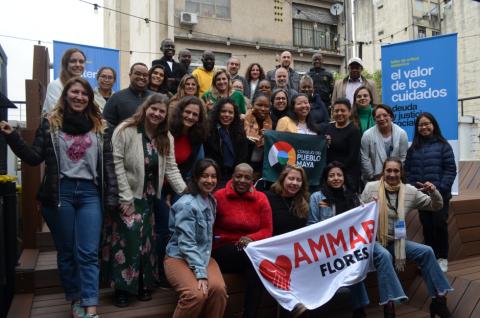
Systemic Critique Workshop Report: "Centering Care, Advancing Debt Justice" (Buenos Aires, Argentina)
June 12-16 2023
From 12-16 June, 30 ESCR-Net members from over 15 countries gathered in Buenos Aires, Argentina for our third Systemic Critique workshop entitled, Centering Care, Advancing Debt Justice. The Systemic Critique Project is a political education initiative within the Network where we are able to create a dedicated space for critical learning and discussions relating to the dominant neoliberal capitalist economic system, with the aim of advancing alternative visions for the future in order to make human rights and social justice a reality for all.
This most recent workshop focused on the intersection of the debt, care, and climate crises and members collectively advanced an intersectional, shared analysis, making clear the importance of understanding the gendered impacts of so-called debt crises, linking them explicitly to the crisis of care. For the first time, a cross section of members from the Economic Policy (EP) and the Women & ESCR working group were able to come together in person to learn, share, strategize and build meaningful solidarities.
Through this workshop, ESCR-Net members were able to begin to analyze the deep-seeded connections between crises of care and crises of debt. Members in Economic Policy reflected on the critical role of care workers in creating the social reproduction needed to drive our society. Dan Owala (PHM Kenya), expressed how he had not realized just how powerful care work was, noting he had an “aha” moment when thinking about the impact of what would happen if all care workers were to go on strike. Through the workshop, the direct connections between sovereign debt and household debt made clear the need for a stronger intersectional feminist analysis when tackling these issues. Members from both working groups found the space to be generative, inspirational, and there was a clear desire to create more spaces to expand political education across the wider membership.
After spending substantial time breaking down the concept, the history, and the impacts of the debt and care crises, the workshop also created the space for members to envision a new world, diving deeper into imagining what a truly caring economy could look like, what it could feel like.
Members first reflected on the current debt crises, pointing out the severe injustices communities are facing due to unfair and illegitimate debts. As Radiatu Sheriff (NRWP) rightly pointed out, “ we are paying for decisions we didn’t make.”
This sentiment was widely affirmed by members drawing the connections between decisions made by colonial powers and debt itself is “a form of colonialism” as put by Carolina Tamagnini (FUNDEPS). It is shackle holding generations of our communities hostage.
“We know that this debt will not be paid for many years and our children and grandchildren will be condemned to paying this debt.” - Juana Toledo (Consejo de Pueblos Wuxtaj).
It was critical for members to draw out the connections between debt and patriarchy, emphasizing the gendered impacts of debt crises on women and people of other oppressed genders. As Hans Cediel (RIPESS LAC) asserted, “we need to overcome patriarchy in the struggle against capitalism.”
The pandemic brought to light the critical need for care work and care workers, yet it also showed just how invisibilized and undervalued this type of work is.
“ What is made visible is the work of men, which is valued at some level, while the work of women is often invisible and unvalued” - Norma Palacios (SINACTRAHO).
Members juxtaposed their transformative visions against the current neoliberal economic system, which is reliant on extraction, exploitation, and oppression to sustain itself. Instead, they began to articulate a collective vision for a caring economy that is centered on principles of care, cooperation, and solidarity. This economy would prioritize care for each other, for mother earth, and for future generations. Care work is what makes all work possible, is what sustains life. Members articulated the need to fortify a global movement that connects collective demands for debt and environmental justice, within a framework of care.
Co-hosting the workshop in Argentina with our member, CELS, allowed for ESCR-Net members from outside the country to root our conversations within a rich history of organizing and resistance. We were fortunate to create a space where members were able to directly connect with local social movements and activists who have long been fighting for gender and economic justice. Movement leaders from La Garganta Poderosa, a revolutionary Latin American movement born in the informal settlements of Buenos Aires, as well as grassroots feminist leaders from the Ni Una Menos movement, shared their experiences allowing members time to learn and better understand .
As we moved through the week, we began to make important strides towards solidifying our advocacy and campaigning objectives. Members identified several key advocacy spaces where we should focus on to advance demands for debt justice and a new social pact on care. Members prioritized the upcoming International Monetary Fund (IMF) and World Bank Annual meetings and the planned counter summit, COP28, and the 112th Session of the International Labor Organization (ILO) Conference (2024).
In reflecting on current demands related to debt justice, a clear commitment from members was to find more ways to explicitly link care and debt within our current analysis. This would include updating member-affirmed demands on debt-justice and integrating a stronger debt-justice angle into the member-developed Social Pact on Care.
